For the 2025 school year, there are 2 public middle schools serving 127 students in Baboquivari Unified School District #40 (4412). This district's average middle testing ranking is 1/10, which is in the bottom 50% of public middle schools in Arizona.
Public Middle Schools in Baboquivari Unified School District #40 (4412) have an average math proficiency score of 5% (versus the Arizona public middle school average of 33%), and reading proficiency score of 12% (versus the 40% statewide average).
Minority enrollment is 100% of the student body (majority American Indian), which is more than the Arizona public middle school average of 65% (majority Hispanic).
Overview
This School District
This State (AZ)
# Schools
6 Schools
1,136 Schools
# Students
1,057 Students
601,819 Students
# Teachers
73 Teachers
23,710 Teachers
Student : Teacher Ratio
14:1
14:1
District Rank
Baboquivari Unified School District #40 (4412), which is ranked within the bottom 50% of all 607 school districts in Arizona (based off of combined math and reading proficiency testing data) for the 2021-2022 school year.
The school district's graduation rate of 45-49% has decreased from 60-64% over five school years.
Overall District Rank
#629 out of 631 school districts
(Bottom 50%)
(Bottom 50%)
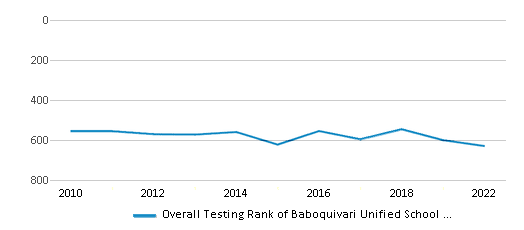
Math Test Scores (% Proficient)
2%
35%
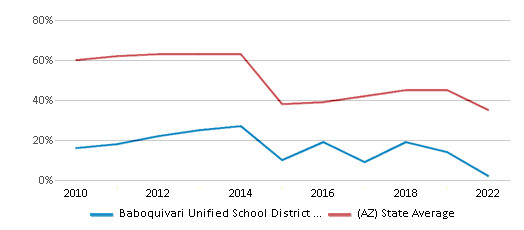
Reading/Language Arts Test Scores (% Proficient)
7%
40%
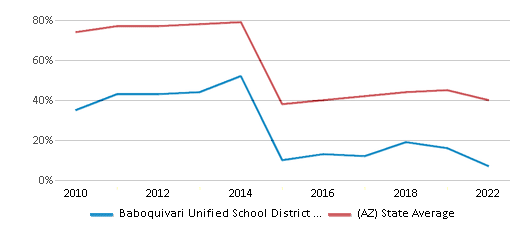
Science Test Scores (% Proficient)
≤5%
24%
Graduation Rate
45-49%
77%
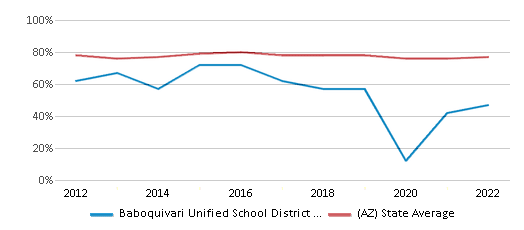
Students by Ethnicity:
Diversity Score
0.19
0.66
# American Indian Students
946 Students
24,869 Students
% American Indian Students
90%
4%
# Asian Students
9 Students
22,000 Students
% Asian Students
1%
4%
# Hispanic Students
98 Students
274,625 Students
% Hispanic Students
9%
46%
# Black Students
n/a
37,295 Students
% Black Students
n/a
6%
# White Students
1 Student
213,598 Students
% White Students
n/a
35%
# Hawaiian Students
n/a
2,094 Students
% Hawaiian Students
n/a
n/a
# Two or more races Students
3 Students
27,338 Students
% of Two or more races Students
n/a
5%
Students by Grade:
# Students in PK Grade:
35
6,008
# Students in K Grade:
62
32,719
# Students in 1st Grade:
76
35,076
# Students in 2nd Grade:
89
36,504
# Students in 3rd Grade:
74
36,347
# Students in 4th Grade:
83
38,172
# Students in 5th Grade:
99
41,445
# Students in 6th Grade:
76
59,688
# Students in 7th Grade:
72
84,224
# Students in 8th Grade:
55
85,183
# Students in 9th Grade:
77
36,231
# Students in 10th Grade:
83
36,652
# Students in 11th Grade:
60
35,943
# Students in 12th Grade:
116
37,463
# Ungraded Students:
-
164
District Revenue and Spending
The revenue/student of $20,249 is higher than the state median of $11,421. The school district revenue/student has declined by 9% over four school years.
The school district's spending/student of $20,071 is higher than the state median of $11,323. The school district spending/student has declined by 9% over four school years.
Total Revenue
$21 MM
$12,837 MM
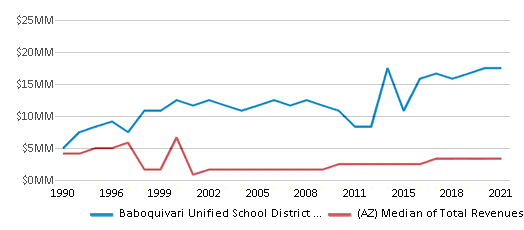
Spending
$21 MM
$12,727 MM
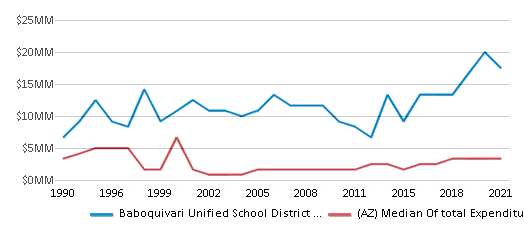
Revenue / Student
$20,249
$11,421
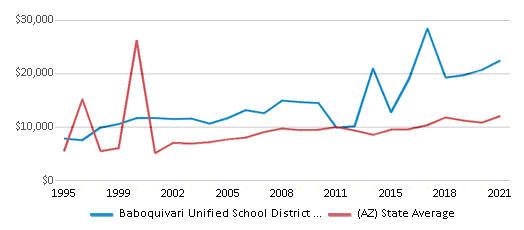
Spending / Student
$20,071
$11,323
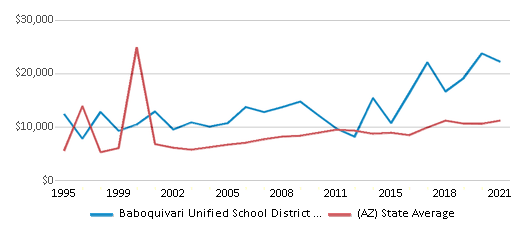
Best Baboquivari Unified School District #40 (4412) Public Middle Schools (2025)
School
(Math and Reading Proficiency)
(Math and Reading Proficiency)
Location
Grades
Students
Rank: #11.
Alternative Middle School (Indian Oasis Middle School)
Alternative School
(Math: <50% | Reading: <50% )
Rank:
Rank:
7/
Top 50%10
111 Main Street
Sells, AZ 85634
(520) 719-1260
Sells, AZ 85634
(520) 719-1260
Grades: 6-8
| 12 students
Rank: #22.
Baboquivari Middle School
(Math: ≤5% | Reading: 10-14%)
Rank:
Rank:
1/
Bottom 50%10
Indian Route 19 Mile Post 19.
Sells, AZ 85634
(520) 719-1250
Sells, AZ 85634
(520) 719-1250
Grades: 7-8
| 115 students
Recent Articles

What Is A Charter School?
Explore the world of charter schools in this comprehensive guide. Learn about their history, how they operate, and the pros and cons of this educational innovation. Discover key facts about charter schools, including admission policies, demographics, and funding, as well as what to look for when considering a charter school for your child.

10 Reasons Why High School Sports Benefit Students
Discover the 10 compelling reasons why high school sports are beneficial for students. This comprehensive article explores how athletics enhance academic performance, foster personal growth, and develop crucial life skills. From improved fitness and time management to leadership development and community representation, learn why participating in high school sports can be a game-changer for students' overall success and well-being.

February 05, 2025
Understanding the U.S. Department of Education: Structure, Impact, and EvolutionWe explore how the Department of Education shapes American education, from its cabinet-level leadership to its impact on millions of students, written for general audiences seeking clarity on this vital institution.





